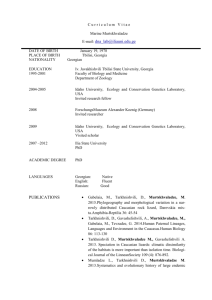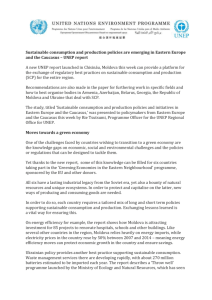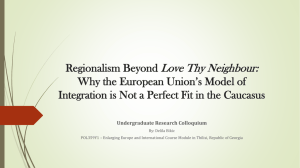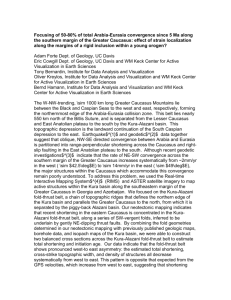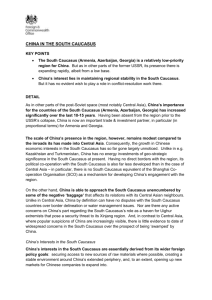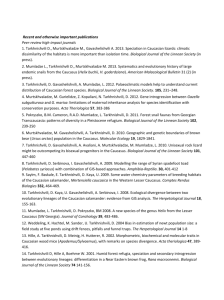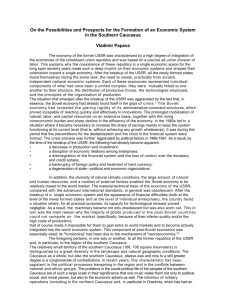Caucasus in the Context of Central and Eastern European Identity
advertisement
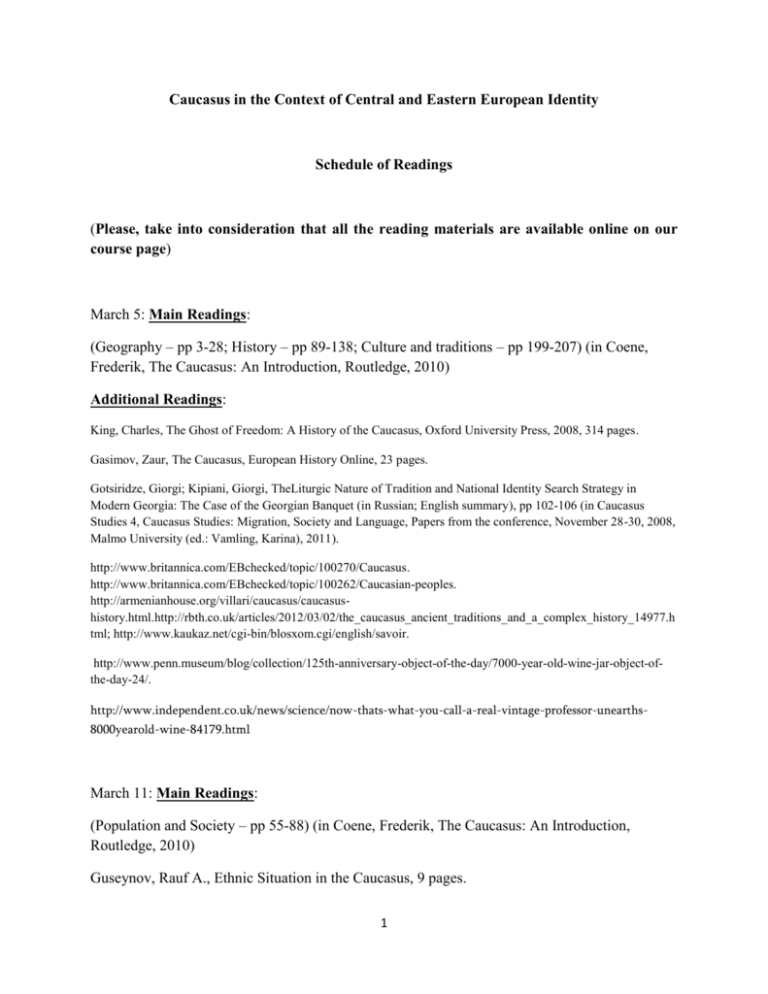
Caucasus in the Context of Central and Eastern European Identity Schedule of Readings (Please, take into consideration that all the reading materials are available online on our course page) March 5: Main Readings: (Geography – pp 3-28; History – pp 89-138; Culture and traditions – pp 199-207) (in Coene, Frederik, The Caucasus: An Introduction, Routledge, 2010) Additional Readings: King, Charles, The Ghost of Freedom: A History of the Caucasus, Oxford University Press, 2008, 314 pages. Gasimov, Zaur, The Caucasus, European History Online, 23 pages. Gotsiridze, Giorgi; Kipiani, Giorgi, TheLiturgic Nature of Tradition and National Identity Search Strategy in Modern Georgia: The Case of the Georgian Banquet (in Russian; English summary), pp 102-106 (in Caucasus Studies 4, Caucasus Studies: Migration, Society and Language, Papers from the conference, November 28-30, 2008, Malmo University (ed.: Vamling, Karina), 2011). http://www.britannica.com/EBchecked/topic/100270/Caucasus. http://www.britannica.com/EBchecked/topic/100262/Caucasian-peoples. http://armenianhouse.org/villari/caucasus/caucasushistory.html.http://rbth.co.uk/articles/2012/03/02/the_caucasus_ancient_traditions_and_a_complex_history_14977.h tml; http://www.kaukaz.net/cgi-bin/blosxom.cgi/english/savoir. http://www.penn.museum/blog/collection/125th-anniversary-object-of-the-day/7000-year-old-wine-jar-object-ofthe-day-24/. http://www.independent.co.uk/news/science/now-thats-what-you-call-a-real-vintage-professor-unearths8000yearold-wine-84179.html March 11: Main Readings: (Population and Society – pp 55-88) (in Coene, Frederik, The Caucasus: An Introduction, Routledge, 2010) Guseynov, Rauf A., Ethnic Situation in the Caucasus, 9 pages. 1 Colarusso, John, Peoples of the Caucasus, 18 pages (in Pike, Pepper, Encyclopedia of Cultures and Daily Life, Ohio, Eastword Publications, 1997). Cornell, Svante E., Small Nations and Great Powers: A Study of Ethnopolitical Conflict in the Caucasus, Rotledge Curzon, 2001, pp 1-46. Bolshakov, Andrey Georgievich; Mansurov, Timur Zufarovich, Conflicts of Identities in theSouth Caucasus and Problems ofIntegration of the States of the Region into European Structures, pp 43-47, World Applied Sciences Journal 27 (Education, Law, Economics,Language and Communication), 2013. The South Caucasus – A Challenge for Europe? Conflicts, Interests, Identities, Western Interpretation – and Basic Approaches, Documentation of a Conference at the Heinrich-BollFoundation, Berlin, May 8-9, 2003, 19 pages. EMI, Annual Reports 2002 to 2008 and Evaluation Report 2007, Excerpts on the Caucasus, European Centre for Minority Issues, 55 pages. Phlipot, Constance A., The North Caucasus: Russian Roulette on Europe’s Borders, Parameters, Summer 2010, pp 87-100. Mankoff, Jeffrey, The Big Caucasus: Between Fragmentation and Integration, A Report of the CSIS Russia and Eurasia Program, March 2012, 37 pages. Baran, Zeyno; Starr, S. Frederick; Cornell, Svante E., Islamic Radicalism in Central Asia and the Caucasus: Implications for the EU, Silk Road Paper, July 2006, Central Asia-Caucasus Institute, Silk Road Studies Program, pp 10-18; 40-45; 49-50. Akhmadov, Yavus; Bowers, Stephen R.; Doss, Marion T., Jr.; Kurnosov, Yulii, Islam in the North Caucasus: A People Divided, Faculty Publications and Presentations, 2009, Paper 20, 32 pages. (http://digitalcommons.liberty.edu/gov_fac_pubs/20) Additional Readings: Geiger, Bernard; Halasi-Kun, Tibor; Kuipers, Aert H.; Menges, Karl H., Peoples and Languages of the Caucasus; A Synopsis, Mouton & Co, Publishers, The Hague, The Netherlands, 1959, 77 pages. Toyota, Junichi, Caucasian Languages and Language Contact in Terms of Religions, pp 114-121. Revzani, Babak, The Uniqueness of the Caucasian Conflicts? pp 11-28. Cornell, Svante E.: Autonomy and Conflict: Ethnoterritoriality and Separatism in the South Caucasus– Cases in Georgia, Department of Peace and Conflict Research, Report No. 61, Uppsala, pp 103-128; 173-224. Meskhidze, Dzhulietta, North Caucasus in a System of All-Caucasian, Russian and European Relations (in Russian; English summary), pp 74-79 (in Caucasus Studies 4, Caucasus Studies: Migration, Society and Language, Papers from the conference, November 28-30, 2008, Malmo University (ed.: Vamling, Karina), 2011). 2 Leitzinger, Antero, Historical Reflections on the War in Chechnya, Perceptions, September-November, 1997, pp 148-155. Cornell, Svante E., Religion as a Factor in Caucasian Conflicts, Civil Wars, Vol. 1 # 3, (Autumn 1998), pp 46-64. Werkner, Ines-Jacqueline,Religion and Its Importance in International Politics: A Case Study of 2008 RussianGeorgian War, Caucasian Review of International Affairs, Vol. 4 (3), CRIA, Summer 2010, pp 237-247. Markedonov, Sergey, The Big Caucasus: Consequences of the “Five Day War”, Threats and Political Prospects, ICBSS, Xenophon Paper, #7, May 2009, 74 pages. Manutscharjan, Aschot, Abkhazia and South Ossetia – Russia’s Intervention in Georgia (August 2008), 5 pages. Cornell, Svante E.; Starr, S. Frederick, The Caucasus: A Challenge for Europe, Silk Road Paper, June 2006, Central Asia-Caucasus Institute, Silk Road Studies Program, pp 25-34. North Caucasus: Views from within (People’s perspectives on peace and security), Report, Saferworld, March 2012,pp 10-18. People’s Peacemaking Perspectives: North Caucasus, Saferworld, March 2012, 6 pages. http://www.womenaid.org/press/info/aid/conflict.html The Caucasus Crisis: International Perceptions and Policy Implications for Germany and Europe (ed.: Schroder, Hans-Henning), SWP Research Paper, StiftungWissenschaft und Politik, German Institute for International and Security Affairs, RP 9, November 2008, Berlin, 59 pages. Georgia & Russia: The “Unknown” Prelude to the “Five Day War” (comment by Malek, Martin), Caucasian Review of International Affairs, Vol. 3 (2), CRIA, Spring 2009, pp 227-232. The North Caucasus Factor in the Georgian-Abkhaz Conflict Context, International Alert, July 2012, 88 pages. The South Caucasus, A Regional Overview and Conflict Assessment, SIDA, Cornell Caspian Consulting, August 2002, pp 47-74. Dunlop, John, Putin, Kozak and Russian Policy toward the North Caucasus, The Jamestown Foundation, 15 pages. Kwast, Steve, Russia Pressures Southern Neighbors, PERSPECTIVE, Vol. 13, #4, March-April 2003, pp 1-8. Nixey, James, The Long Goodbye: Waning Russian Influence in the South Caucasus and Central Asia, The Means and Ends of Russian Influence Abroad Series, Chatham House, Briefing Paper, 16 pages. Documented Evidence, www.justicefornorthcaucasus.info, www.radioadiga.com Russia and the Caucasus (http://www.bits.de/NRANEU/RussiaCaucasus.html) https://www.academia.edu/2463909/Some_Characteristics_of_Identity_among_Ethnic_Groups_in_Georgia_and_th e_Caucasus._Ostrog_Academy_Naukovi_Zapiski_Kulturologia_Issue_9_Ostrog_May_2012._pp._217-234 Popjaneski, Johanna, Minorities and the State in the South Caucasus: Assessing the Protection of National Minorities in Georgia and Azerbaijan, Silk Road Paper, Central Asia-Caucasus Institute, Silk Road Studies Program, September 2006, pp 25-75. 3 Simonsen, Sven Gunnar, Between Minority Rights and Civil Liberties: Russia’sDiscourse Over “Nationality” Registration and theInternal Passport, Nationalities Paper, Vol. 33, No. 2, June 2005, pp 211-229. North Caucasus: Views from within (People’s perspectives on peace and security), Report, Saferworld, March 2012,pp 2-9; 19-40. Nichol, Jim, Stability in Russia’s Chechnya and OtherRegions of the North Caucasus:Recent Developments, CRS Report for Congress: Prepared for Members and Committees of Congress, Congressional Research Service, December 13, 2010, 26 pages. The South Caucasus, A Regional Overview and Conflict Assessment, SIDA, Cornell Caspian Consulting, August 2002, pp 13-44. Wertsch, James V., Five Things Worth Knowing about the Caucasus (http://pulitzercenter.org/reporting/eurasiacaucasus-soviet-union-tsarnaev-boston-marathon-chechnya-dagestan-georgia-armenia-azerbaijan-culturegeography-violence-religion-conflict) Caucasus Analytical Digest #27, 27 May 201, 14 pages. (http://www.isn.ethz.ch/DigitalLibrary/Publications/Detail/?ots591=0c54e3b3-1e9c-be1e-2c24-a6a8c7060233&lng=en&id=129726) Snetkov, Aglaya, Russia in the Caucasus (http://www.isn.ethz.ch/Digital-Library/Articles/SpecialFeature/Detail/?lng=en&id=159737&contextid774=159737&contextid775=159733&tabid=1453527586) O’Loughlin,John; Kolossov, Vladimir; Radvanyi, Jean, The Caucasus in a Time of Conflict,DemographicTransition, and Economic Change, Eurasian Geography and Economics, Bellwether Publishing, Ltd., 2007, 48, No. 2,pp. 135– 156. Khelashvili, George, Georgian Perceptions of the North Caucasus and of U.S.-Russian Relations, PONARS EurasiaPolicy Memo No. 148, May 2011, pp 1-5. http://www.iranicaonline.org/articles/caucasus-i Ratliff, Rebecca, South Ossetian Separatism in Georgia, ICE Case Studies, Number 180, May 2006 (http://www1.american.edu/ted/ice/ossetia.htm) http://drc.dk/relief-work/where-we-work/caucasus/ Ethno-Nationalism, Islam and the State in the Caucasus: Post-Soviet Disorder (ed. Moshe Gammer), London and New York: Routledge, 2008, 233 pages. (http://books.google.ge/books?id=MFl9AgAAQBAJ&pg=PT51&lpg=PT51&dq=Islam+in+Caucasus&source=bl&o ts=54SS9t2A5n&sig=DvXGKSywoaBYyA324zs3mc9WRk&hl=en&sa=X&ei=uCxiVLuNMoWp7AbN0YC4CQ&ved=0CFMQ6AEwCDgU#v=onepage&q=I slam%20in%20Caucasus&f=false) Halbach, Uwe, Islam in the North Caucasus, Archives de sciences sociales des religions, 115 | juillet-septembre 2001, pp 2-15. Matveeva, Anna; Oliphant, Craig; Russell, John; Sagramoso, Domitilla, The North Caucasus: Islam, Security and Politics, Russia and Eurasia Programme Meeting Summary, 27 June 2012, 7 pages. Markedonov, Sergey, Radical Islam in theNorth Caucasus: Evolving Threats, Challenges, and Prospects, A Reportof the CSIS Russia and Eurasia Program, CSIS, November 2010, 13 pages. 4 Wiktor-Mach, Dobrosława, Competing Islamic Traditions in the Caucasus, Caucasian Review of International Affairs, Vol. 3 (1), CRIA, Winter2009, pp 63-69. The North Caucasus: The Challenges of Integration (II),Islam, the Insurgency and Counter-Insurgency, Crisis Group Europe Report #221, 19 October 2012, 41 pages. Alonso, Sonia, Islamic Extremism in the North Caucasus: What Kind of Threat for Regional Security? 4 pages. Zelkina, Anna, Islam and Politics in the North Caucasus, Religion, State and Society, Vol. 21, No. I, 1993, pp 115124. Prasad, Conor, Georgia’s Muslim Community: A Self-Fulfilling Prophecy? ECMI Working Paper #58, February 2012, 25 pages. http://www.kafkas.org.tr/english/kultur/din.html March 16: Main Readings: Held, David; Mcnally, Kyle, Europe, the EU and European Identity, Open Democracy, 7 February, 2014 (https://www.opendemocracy.net/can-europe-make-it/david-held-kylemcnally/europe-eu-and-european-identity) Walkenhorst, Heiko, The Conceptual Spectrum of European Identity: From Missing Link toUnnecessary Evil, Limerick Papers in Politics and Public Administration, 2009, No. 3, pp 118. Walkenhorst, Heiko, Constructing the European identity - Trap or gap? European integrationbetween Community-buildingand Path-dependency, Limerick Papers in Politics and PublicAdministration, 2008, No. 1, pp 1-18. Castells, Manuel, The Construction of European Identity, Statement prepared for the EuropeanPresidency of the European Union, 9 pages. Rubenstein, Richard L., Islam and Christianity: The Roots of Europe’s Religious Identity, December 2011 (http://www.newenglishreview.org/custpage.cfm/frm/102790/sec_id/102790) Christianity created the European identity, Pope Benedict says (http://www.catholicnewsagency.com/news/christianity_created_the_european_identity_pope_be nedict_says/) Region, State and Identity in Central and Eastern Europe (ed. Batt, Judy; Wolczuk, Kataryna), Frank Cass & Co. Ltd., 2002, pp 1-14; 203-213. Pollack, Detlef, European and national identity in post-communist societies: coincidence or contrast? ”Think piece”, 6 pages. 5 Tieanu, Alexandra, From Alterity to Identity: A Central European View of Europe at the End of the Twentieth Century, journal of the lucas graduate conference, 30 pages. (https://openaccess.leidenuniv.nl/bitstream/handle/1887/20533/JLGC-17%20Tieanu.pdf?sequence=1) Gongola, Laura Herta, Western European “Identity” Versus Eastern European “Identity”? 8 pages. Additional Readings: EU Research on Social Sciences and Humanities, Representations of Europe and the Nation in Current and Prospective Member-States: Media, Elites and Civil Society, EURONAT, Final Report, Project HPSE – CT200100044, Funded under the key action “Improving the socioeconomic knowledge base” of FP5, DG Research, European Commission, 2004, 194 pages. Roose, Jochen, How European is European Identity? Extent and Structure of Continental Identification in Global Comparison Using SEM, KFG Working Paper Series, No. 19, November 2010, Kolleg-Forschergruppe(KFG) “The Transformative Power of Europe“, FreieUniversität Berlin, 22 pages. Twist, Kimberly, The Devil is in the Demos: The Identification of European Citizens with Europe, Center forEuropean Studies, New York University, pp 3-38. Moes, Jeroen, European identity compared: A mixed methods approach, Prepared for the ECPRFourth PanEuropean Conference on EU-Politics, 25-27 September, Riga, Latvia, 31 pages. Eder, Klaus; Spohn, Willfried, Collective Memory and European Identity: The Effects of Integration and Enlargement, Ashgate, Jan 1, 2005, 228 pages. Karolewski, IreneuszPawel,Citizenship and Collective Identity in Europe, Routledge, 2010, 100 pages. Eriksen,ErikOddvar; Fossum,John Erik; Kumm, Mattias; Menéndez, Agustín José, The European Constitution:the Rubicon crossed?ARENA, Oslo, February 2005, 63 pages. Dana, Irina, Rediscovering Culture: The Unexplored Dimension of European Democratic Identity, Journal for Communication and Culture 2, no. 1, Institute for Communication and Culture, Spring 2012, pp88-104. https://www.opendemocracy.net/can-europe-make-it/rui-tavares/saving-europe-reformulating-rules Nelsen, Brent F.; Guth, James L.; Fraser, Cleveland R., Does Religion Matter? European Union Politics, Vol. 2 (2), SAGE Publications, London, Thousand Oaks CA,New Delhi, pp 191–217. Nelsen, Brent F.; Guth, James L., Religion and Attitudes toward the European Union: The New Member States: A Research Note,Prepared for delivery at the European Union Studies Association Ninth Biennial International Conference, Hyatt Regency Austin, Austin, Texas, 31 March-2 April 2005. Garipzanov, Ildar H., Historical Narratives and Christian Identity on a European Periphery: Early History Writing in Northern, East-Central, and Eastern Europe (c.1070–1200), Book Series: Medieval Texts and Cultures of Northern Europe, TurnhoutBrepols Publishers, Vol. 26, 2011, 294 pages.(http://brepols.metapress.com/content/h1v532/) 6 Magister, Sandro, It´s Secular Because It´s Christian: Europe Seeks its Identity Card; Ferrari, Silvio, What Distinguishes Europe from Other Civilizations; De Marco, Pietro, Europe, Secularism, and Christianity (http://chiesa.espresso.repubblica.it/articolo/6978?eng=y) Zemni, Sami, Islam, European Identity and the Limits of Multiculturalism (http://www.cie.ugent.be/CIE/zemni3.htm) The Religious Roots of Contemporary European Identity (Faltin, Lucia; Wright, Melanie J.), TGT Clark Theology, Continuum International Publishing Group, London, NY, 2007, 229 pages. (http://books.google.ge/books?id=85PUAwAAQBAJ&pg=PA15&lpg=PA15&dq=christianity+european+identity&s ource=bl&ots=-wlqUmJd06&sig=5Db9Tat0tv056Y_bcO4jEs0gLw&hl=en&sa=X&ei=XM1sVPqmI8TuyQOO6YCABg&redir_esc=y#v=onepage&q=christianity%20european %20identity&f=false) Casanova, José, Does one need references to God or to the Christian heritage in the new European constitution or does Europe need a new secular “civil religion” based on Enlightenment principles? Religion, European Secular Identities and European Integration (in Michalski, Krzysztof, Religion in the New Europe, CEU Press, Hors collection, 2006-2013) (http://books.openedition.org/ceup/1252) Arizumi, Amy, The European Union: Creating a Pan-European Identity? December 11, 2011 (http://www.academia.edu/2991002/The_European_Union_Creating_a_Pan-European_Identity) Europe And Islam: Shared History, Shared Identity, Speech of his Excellency Prof. Ekmeleddin Ihsanoglu, Secretary General of the Organization of the Islamic Conference at the Center for Dialogues (http://islamuswest.org/events_Islam_and_the_West/europe_islam_shared_identity/europe_islam_shared_identity_s peech.html). Chudžiková, Alena; Kasprowicz, Dominika; Vít, Michal, National Identities in CEE – country case studies (http://www.ceeidentity.eu/news/national-0) Kola, Adam F., Eastern, Central, or East-Central Europe? Identity Dilemmas in Contemporary Poland, Paper prepared for the Euroacademia International Conference: Re-Inventing Eastern Europe, Vienna, 17 – 19 May 2012, 6 pages. Regions in Central and Eastern Europe: Past and Present (ed. Hayashi Tadayuki; Hiroshi,FUKUDA), 21st Century COE Program Slavic Eurasian Studies, No.15, Slavic Research Center, 2007, 333 pages. Moshelova, Mila, European Identity in a Transforming Political Space: Eastern Enlargement and its Challenges, Nouvelle Europe [en ligne], Saturday 15 February 2014 (http://www.nouvelle-europe.eu/en/european-identitytransforming-political-space-eastern-enlargement-and-its-challenges) Tsvetkova, Sofiya y., European Identity Formation in Central and Eastern European Countries after Accession by the European Union, European Identity Formation, ASPJ Africa & Francophonie– 4thQuarter 2010, pp 54-78. Theoretisations of European Identity: The case of Eastern European countries, 17 pages. (http://pjpeu.coe.int/documents/1017981/1668207/THEORETISATIONS_OF_EUROPE.pdf/a14d04bd-282d-4d20-b96c1dae78fd3d99) Lane, David, Elites and Identities in Post-Soviet Space, Routledge, University of Glasgow, 149 pages. (http://books.google.ge/books?id=8UHcAAAAQBAJ&pg=PA19&lpg=PA19&dq=central+and+eastern+european+i dentity&source=bl&ots=sHjdAGoqsU&sig=cd_fZFwr_nMiHo1mwSVqdRX53R0&hl=en&sa=X&ei=LZ1sU6T4G KSe7AbXlYHoDA&redir_esc=y#v=onepage&q=central%20and%20eastern%20european%20identity&f=false) 7 March 19: Main Readings: Cornell, Svante E.: Autonomy and Conflict: Ethnoterritoriality and Separatism in the South Caucasus – Cases in Georgia. Department of Peace and Conflict Research, Report No. 61, Uppsala, pp 61-90. Suny, Ronald Grigor, Provisional Stabilities: The Politics of Identities in Post-Soviet Eurasia, 23 pages. (http://www.dartmouth.edu/~crn/crn_papers/Suny.pdf) Suleymanov, Elin, Emergence of New Political Identity in the South Caucasus: Energy, Security, Strategic Location and Pragmatism, The Fletcher School, May 2004, pp 4-28; 68-70. Cornell, Svante E.; Starr, S. Frederick, The Caucasus: A Challenge for Europe, Silk Road Paper, June 2006, Central Asia-Caucasus Institute, Silk Road Studies Program, pp 11-24; 71-85. Mkrtchyan, Tigran, Huseynov, Tabib, Gogolashvili, Kakha, The European Union and the South Caucasus: Three Perspectives on the Future of the European Project from the Caucasus, Europe in Dialogue 01, Bertelsmann Stiftung, Gütersloh 2009, pp 14-22; 49-92; 103-105. Priego, Alberto, NATO Cooperation towards South Caucasus, Caucasian Review of International Affairs, VOL. 2 (1), Winter 2008, CRIA, pp 50-57. Melvin, Neil J., Building Stability in the North Caucasus: Ways Forward for Russia and the European Union, SIPRI Policy Paper No. 16, SIPRI, May 2007, pp 37-47. Alieva, Leila, EU and South Caucasus, Bertelsmann Group for Policy Research, CAP Discussion Paper, December 2006, 18 pages. Nilsson Niklas; Popjanevski, Johanna, State Building Dilemmas: The Process of National Integration in Post Revolutionary Georgia, State Building Dilemmas, pp 8-12. Cornell, Svante E.; Starr, S. Frederick, The Caucasus: A Challenge for Europe, Silk Road Paper, June 2006, Central Asia-Caucasus Institute, Silk Road Studies Program, pp 38-41. Chelidze, Ana, Ethno-Nationalistic and Religious-Nationalistic Components of Identity in PostSoviet Georgia, Occasional Papers on Religion in Eastern Europe, Vol. XXXIV, No. 2, March 2014, pp 1-20. Grebennikov, Marat, Ethnicity versus Religion: Conflicting Sources of Political Mobilization in the North Caucasus, A Thesis In the Humanities Program, Presented in Partial Fulfillment of the Requirements for the Degree of Doctor of Philosophy (Humanities) at Concordia University, Montreal, Quebec, Canada, September 2012, pp 61-120. 8 The South Caucasus, A Regional Overview and Conflict Assessment, SIDA, Cornell Caspian Consulting, August 2002, pp 29-30; 47-48; 50-53; 56-57; 63-64. National Individualism – Collectivism Scores, 09.07.2013 (https://hbdchick.wordpress.com/2013/09/07/national-individualism-collectivism-scores/) Muradyan, Olena; Shirokanova, Anna; Matosyan, Tigran, Value Change in New Eastern Europe (http://www.academia.edu/1891110/VALUE_CHANGE_IN_NEW_EASTERN_EUROPE) Jamagidze, Lela; Shaburishvili, Shota; Papachashvili, Nino; Sikharulidze, David, The Sociocultural Environment of International Business in Georgia, Research Report, American Journal Experts Association, pp 5-11; 13-17; 22; 35; 37; 39, 41-44. Additional Readings: Brooks, Kate, The Caucasus: A case of mistaken identity? (http://politicsinspires.org/the-caucasus-a-case-ofmistaken-identity/) Cornell, Svante E.: Autonomy and Conflict: Ethnoterritoriality and Separatism in the South Caucasus – Cases in Georgia. Department of Peace and Conflict Research, Report No. 61, Uppsala, pp 129-224. Goddard, Scott E., The Caucasus: Stormy Past, Bumpy Future? YETT, 24 pages. South Caucasus – 20 Years of Independence, Friedrich-Ebert-Stiftung, pp 12-76. Identities, Ideologies and Institutions. A Decade of Insight into the Caucasus: 2001-2011. (ed. Iskandaryan, Alexander), Yerevan: Caucasus Institute, 2011, pp 32-74; 89-152. Stidger, Amy Nicole, The Ties That Bind: Reimagining Memory in Armenian Identity Formation, The University of Texas at Austin, May 2014, 93 pages. http://www.antipasministries.com/html/file0000171.htm Shkolnikov, Vladimir D., Putting the “Color Revolutions” behind or Welcome Back Flashman(?): Western Policies towards the South Caucasus in 2007, pp 166-179 (in Identities, Ideologies and Institutions. A Decade of Insight into the Caucasus: 2001-2011. (ed. Iskandaryan, Alexander), Yerevan: Caucasus Institute, 2011, 232 pages.) Shkolnikov, Vladimir D., Drifting Apart? The West and South Caucasus in 2009, pp 212-226 (in Identities, Ideologies and Institutions. A Decade of Insight into the Caucasus: 2001-2011. (ed. Iskandaryan, Alexander), Yerevan: Caucasus Institute, 2011, 232 pages.) Simão, Licínia, EU-South Caucasus relations: do good governance and security go together? 30 pages. Haydar, Efe, Foreıgn Polıcy of the European Unıon Towards the South Caucasus, International Journal of Business and Social Science, Vol. 3 No. 17; September 2012, pp 187-199. Delcour, Laure, The European Union's Policy in the South Caucasus: In Search of a Strategy, 2011, pp. 177-194 (https://www.academia.edu/6418790/The_European_Unions_Policy_in_the_South_Caucasus_In_Search_of_a_Strat egy) 9 Khelashvili, George, Foreign Perceptions of Georgian Democracy: Post-Soviet Regional Security Context, pp 7378. (in Democratization and Security in Central and Eastern Europe and the Post-Soviet States (eds. Brockmann, Kathrin, Bosold, David), 12th New Faces Conference, March 16–18, 2009, Prague, Czech Republic, a cooperation of German Council on Foreign Relations (DGAP), DGAPbericht, Forschungsinstitut der Deutschen Gesellschaft für Auswärtige Politik, #17, Berlin, October 2009) Bardakçı, Mehmet, EU Engagement in Conflict Resolution in Georgia: Towards a More Proactive Role, Vol. 4 (3) Summer 2010, Caucasian Review of International Affairs, Vol. 4 (3), Summer 2010, CRIA, pp 214-236. Freire, Maria Raquel, Security in the South Caucasus: the EU, NATO and Russia, Noref Policy Brief – February 2013, 3 pages. NATO’s Policy in South Caucasus and future perspectives, 9 pages. Tatikian, Sossi, Euro-Atlantic Integration Trends of the South Caucasian States, Central Asia and the Caucasus, #4 (40), 2006, pp 107-113. (http://cyberleninka.ru/article/n/euro-atlantic-integration-trends-of-the-south-caucasianstates) Pollack, Detlef, European and national identity in post-communist societies: coincidence or contrast? ”Think piece”, 6 pages. Nilsson Niklas; Popjanevski, Johanna, State Building Dilemmas: The Process of National Integration in Post Revolutionary Georgia, State Building Dilemmas, pp 7-44. Gallina, Nicole, Puzzles of State Transformation: The Cases of Armenia and Georgia, Caucasian Review of International Affairs, VOL. 4 (1), Winter 2010, CRIA, pp 20-34. Huber, Martina, State-Building in Georgia: Unfinished and at Risk? Netherlands Institute of International Relations, ‘Clingendael’, Conflict Research Unit, February 2004, 95 pages. Anglin, Ashley Elizabeth, Promoting Civic Habits in Multi-Cultural Schools, SSN, Key Findings, December 2012, 2 pages. Motivations for Political and Volunteer Civic Participation among Diverse Youth: More Similarities than Differences, For Research in Human Development special issue on Diverse Routes to Civic Participation Across Ages and Cultures, 28 pages. Jones, Stephen, Georgia: Nationalism from under the Rubble, After Independence: Making and Protecting the Nation in Postcolonial and Postcommunist States (ed. Lowell, W. Barrington), http://www.press.umich.edu/titleDetailDesc.do?id=126246, The University of Michigan Press, pp 248-276. Sarjveladze, Nodar ; Shushania, Nino; Melikishvili, Lia; Baliashvili, Marina, Tolerance in Multiethnic Georgia (Training Methodology Manual for Educators), Publishing house “Mtsignobari”, Tbilisi, 2009, 151 pages. Political Transformation and Social Change in the South Caucasus: Georgia, Armenia and Azerbaijan in Perspective, 3rd ASCN Annual Conference, ASCN Programme, pp 26-28; 41-44. March 25: Main Readings: 10 Malakyan, Petros G., Anthropology of Leadership: An Armenian Perspective, Journal of Leadership, Accountability and Ethics vol. 10(3) 2013, pp 107-126. Asad, Ruslan, Supermarket Society Concept, May 4, 2010 (http://ruslanasad.wordpress.com/2010/05/04/) Arutunyan, Anna, Russia shrugged: Searching for national identity (http://themoscownews.com/russia/20130918/191929261-print/Russia-shrugged.html) South Caucasus – 20 Years of Independence, Tbilisi: Friedrich-Ebert-Stiftung, 2011, pp 77-123. Kościński, Piotr; Zasztowt, Konrad, Russia’s Choices in the North Caucasus after the Attacks in Volgograd (http://isnblog.ethz.ch/security/russias-choices-in-the-north-caucasus-after-theattacks-in-volgograd) Natalizia, Gabriele, The Baltic and Caucasian States after the Transition. Democratization and State Consolidation, 23 pages. Pridham, Geoffrey, On the Cusp between Democratic Transition and Consolidation in EasternCentral Europe? Regime Change Patterns and External Impacts Reassessed, Paper for Conference on Early Lessons from the Post-Cold War Era: Western Influences on Central and Eastern European Transitions, organized by Centre for Applied Policy Research, Munich, and Institute for Public Affairs, Bratislava, in Bratislava, 12-13 October 2000, pp 1-10. Alieva, Leila, EU and South Caucasus, Discussion Paper, Bertelsmann Group for Policy Research, C·A·P, December 2006, 18 pages. Bolshakov, Andrey Georgievich; Mansurov, Timur Zufarovich, Conflicts of Identities in the South Caucasus and Problems of Integration of the States of the Region into European Structures, World Applied Sciences Journal 27 (Education, Law, Economics, Language and Communication), IDOSI Publications, 2013, pp 43-47. The North Caucasus: The Challenges of Integration (I), Ethnicity and Conflict, Europe Report N ° 220 – 19 October 2012, International Crisis Group, pp 3-8. The North Caucasus: The Challenges of Integration (II), Islam, the Insurgency and CounterInsurgency, Europe Report N°221 – 19 October 2012, International Crisis Group, pp 3-12. Boatcă, Manuela; Costa, Sérgio; Gutiérrez Rodríguez, Encarnación, Decolonizing European Sociology: Different Paths towards a Pending Project, Introduction (https://www.ashgate.com/pdf/SamplePages/Decolonizing_European_Sociology_Intro.pdf) Guseynov, Rauf A., Ethnic Situation in the Caucasus (http://sam.gov.tr/wpcontent/uploads/2012/01/6.-ETHNIC-SITUATION-IN-THE-CAUCASUS.pdf) 11 Kakachia, Kornely, Georgia’s Identity-Driven Foreign Policy and the Struggle for Its European Destiny, Caucasus Analytical Digest No. 37, 29 March 2012, pp 4-7. The Making of Modern Georgia, 1918-2012: The First Georgian Republic and Its Successors (ed. Jones, Stephen F.), Routledge, 2014, pp 320-331. Natia Mestvirishvili and Maia Mestvirishvili. “‘I am Georgian and therefore I am European:’ Re-searching the Europeanness of Georgia”, CEJISS, Issue 8:1, 2014, pp 52-65. Behrendt, Sven; Kempe, Iris, South Caucasus 2025: Scenarios for an Uncertain Future, Caucasus Analytical Digest 19/10, pp 2-4. TSG IntelBrief: The North Caucasus: In the Shadow of Sochi, February 7, 2014 (http://soufangroup.com/tsg-intelbrief-the-north-caucasus-in-the-shadow-of-sochi/). Additional Readings: Major Trends of Inter-Ethnic Relations in the Russian Federation in 2012: Vision of Civil Society, Civic Chamber of the Russian Federation, 3 pages. Grebennikov, Marat, Ethnicity versus Religion: Conflicting Sources of Political Mobilization in the North Caucasus, A Thesis In the Humanities Program, Presented in Partial Fulfillment of the Requirements for the Degree of Doctor of Philosophy (Humanities) at Concordia University, Montreal, Quebec, Canada, September 2012, pp 121-267. Basu-Zharku, Iulia O., Effects of Collectivistic and Individualistic Cultures on Imagination Inflation in Eastern and Western Cultures (http://www.studentpulse.com/articles/385/effects-of-collectivistic-and-individualistic-cultureson-imagination-inflation-in-eastern-and-western-cultures) Khoury, Haitham A., Measuring culture: The development of a multidimensional culture scale, Graduate Theses and Dissertations, 2006, 81 pages (http://scholarcommons.usf.edu/etd/2584) Lucke, Kai; Rigaut, Aloys, Cultural Issues in International Mediation, EU as Mediator, version 0, June 2002, 45 pages. Jamagidze, Lela; Shaburishvili, Shota; Papachashvili, Nino; Sikharulidze, David, The Socio-cultural Environment of International Business in Georgia, Research Report, American Journal Experts Association, pp 17-21; 29-30; 33; 36; 38. South Caucasus – 20 Years of Independence, Tbilisi: Friedrich-Ebert-Stiftung, 2011, 360 pages. Papava, Vladimer, On the Vector of Economic Development of Post-Communist Georgia, Expert Opinion, GFSIS, #7, 2013, 18 pages. Rustemova, Assel, Understanding Authoritarian Liberal Regimes: Governing Rationales, Industrialization Patterns and Resistance, A Dissertation submitted to the Graduate School-Newark, Rutgers, The State University of New Jersey, in partial fulfillment of the requirements for the degree of Doctor of Philosophy, Graduate Program in Global Affairs, Written under the direction of Cerny, Philip, Newark, New Jersey, May 2012, 319 pages. Democratization and Security in Central and Eastern Europe and the Post-Soviet States (eds. Brockmann, Kathrin, Bosold, David), 12th New Faces Conference, March 16–18, 2009, Prague, Czech Republic, a cooperation of 12 German Council on Foreign Relations (DGAP), DGAPbericht, Forschungsinstitut der Deutschen Gesellschaft für Auswärtige Politik, #17, Berlin, October 2009, 100 pages. Freire, Maria Raquel; Simão, Licínia, The Armenian Road to Democracy: Dimensions of a Tortuous Process, CEPS Working Document No. 267/May 2007, 25 pages. Tarkhan-Mouravi, George, Some Characteristics of Identity among Ethnic Groups in Georgia and the Caucasus, Наукові записки. Серія “Культурологія”, 2012, 217-234. Kuzio, Taras, Transition in Post-Communist States: Triple or Quadruple? Politics, Vol. 21 (3), 2001, pp 168-177. Delcour, Laure; Duhot, Hubert, Bringing South Caucasus Closer to Europe: Achievements and Challenges in ENP Implementation, Department of European Interdisciplinary Studies, College of Europe, Natolin Research Papers, 03 / 2011, 65 pages. Markedonov, Sergey, Radical Islam in the North Caucasus: Evolving Threats, Challenges, and Prospects, A Report of the CSIS Russia and Eurasia Program, CSIS, November 2010, 13 pages. The South Caucasus between the EU and the Eurasian Union (special ed.: Kempe, Iris), Caucasus Analytical Digest No. 51–52, 17 June 2013, 27 pages. Ditrych, Ondrej, Identities, Interests and the Resolution of the Abkhaz Conflict, Caucasian Review of International Affairs, Vol. 2 (3), CRIA, Summer 2008, pp 112-123. Bolshakov, Andrey Georgievich; Mansurov, Timur Zufarovich, Conflicts of Identities in the South Caucasus and Problems of Integration of the States of the Region into European Structures, pp 43-47, World Applied Sciences Journal 27 (Education, Law, Economics, Language and Communication), 2013. Weiss, Gilbert, Legitimation, Representation and the Construction of Identities: Some theoretical remarks with relevance to European integration and regionalism in the EU, Paper delivered for the Colloquium “The Construction and Legitimation of Regional Identity”, Lancaster University, 30 November – 02 December 2006, 27 pages. Lordkipanidze, David, Georgia and the region's European aspirations: Building the Future on a Vibrant Past (http://www.coe.int/t/policy-planning/Debates/Identity_Debates/Speech_Lordkipanidze_en.pdf) Rondeli, Alexander, The Choice of Independent Georgia, pp 195-211 (in The Security of the Caspian Sea Region (ed.: Chufrin, Gennady), Sipri, Oxford University Press, 2001) Samokhvalov, Vsevolod, “Colored Revolutions” in the Wider Black Sea Region and the “Geopoliticization” of Democracy, pp 33-37. (in Democratization and Security in Central and Eastern Europe and the Post-Soviet States (eds. Brockmann, Kathrin, Bosold, David), 12th New Faces Conference, March 16–18, 2009, Prague, Czech Republic, a cooperation of German Council on Foreign Relations (DGAP), DGAPbericht, Forschungsinstitut der Deutschen Gesellschaft für Auswärtige Politik, #17, Berlin, October 2009) Kandelaki, Giorgi, Georgia’s Rose Revolution: A Participant’s Perspective, United States Institute of Peace, Special Report 167, July 2006, pp 1-12. Chedia, Beka, Georgia: The Long Journey from the Byzantine Empire to the European Union, 09.01.2012 (http://eastbook.eu/en/2012/01/material-en/news-en/georgia-the-long-journey-from-the-byzantine-empire-to-theeuropean-union/). 13 Kirchanov, Maxim, “Europe” and “The West” in Georgia’s Political Imagination and Nationalist Discourse, Central Asia and the Caucasus, 2010, # 2, pp 158-167. (http://cyberleninka.ru/article/n/europe-and-the-west-in-georgia-spolitical-imagination-and-nationalist-discourse). Berglund, Christofer, Georgia, Chapter 22, Handbook of Political Change in Eastern Europe, pp 1-46. Mathuros, Fon, Collaboration Key to Economic Future of South Caucasus and Central Asia (http://www.weforum.org/news/collaboration-key-economic-future-south-caucasus-and-central-asia). Melvin, Neil J., Building Stability in the North Caucasus: Ways Forward for Russia and the European Union, SIPRI Policy Paper No. 16, SIPRI, May 2007, pp 37-47. Verne, Jules, The Adventures of a Special Correspondent, 343 pages. 14
